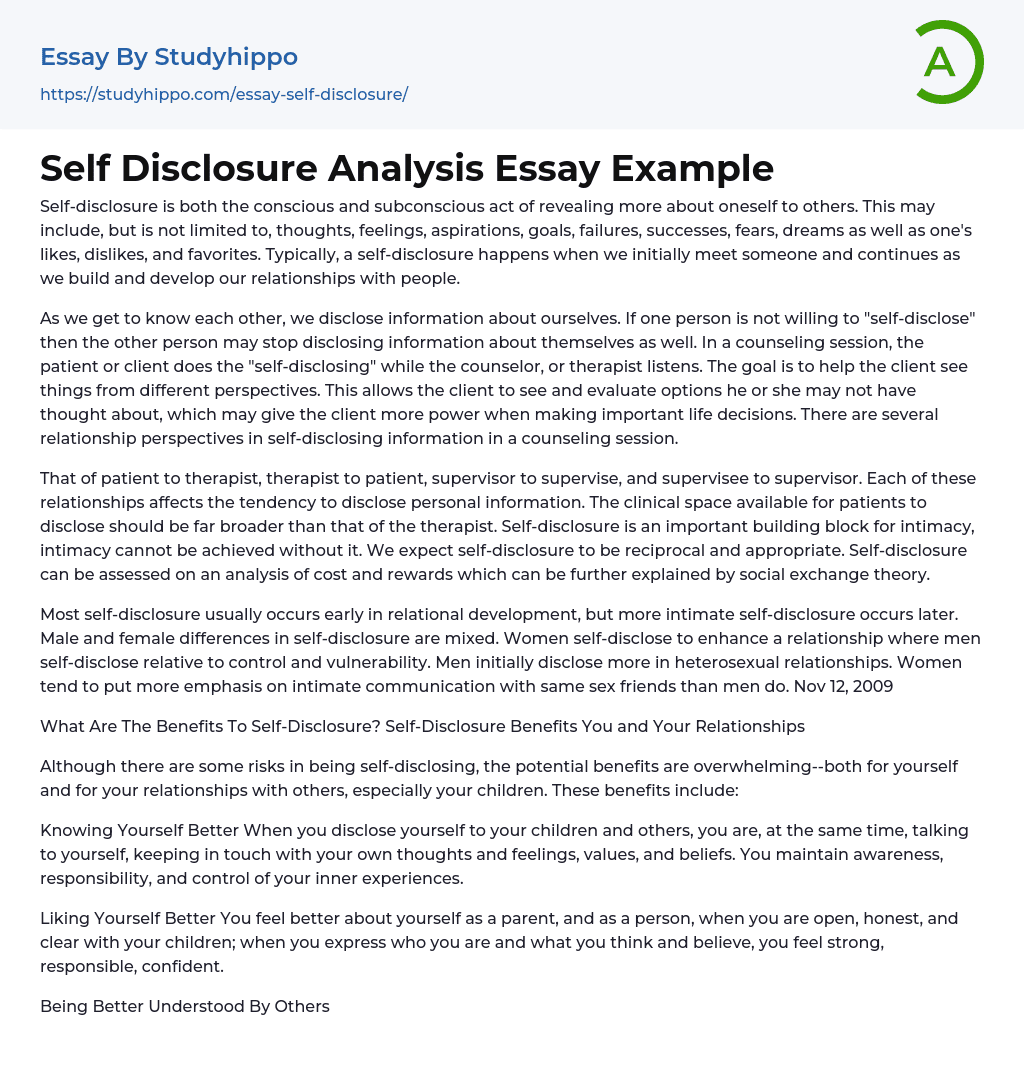Self-disclosure is both the conscious and subconscious act of revealing more about oneself to others. This may include, but is not limited to, thoughts, feelings, aspirations, goals, failures, successes, fears, dreams as well as one's likes, dislikes, and favorites. Typically, a self-disclosure happens when we initially meet someone and continues as we build and develop our relationships with people.
As we get to know each other, we disclose information about ourselves. If one person is not willing to "self-disclose" then the other person may stop disclosing information about themselves as well. In a counseling session, the patient or client does the "self-disclosing" while the counselor, or therapist listens. The goal is to help the client see things from different perspectives. This allows the client to see and evaluate options he or she may not have thought about, which may give the client more power
...when making important life decisions. There are several relationship perspectives in self-disclosing information in a counseling session.
That of patient to therapist, therapist to patient, supervisor to supervise, and supervisee to supervisor. Each of these relationships affects the tendency to disclose personal information. The clinical space available for patients to disclose should be far broader than that of the therapist. Self-disclosure is an important building block for intimacy, intimacy cannot be achieved without it. We expect self-disclosure to be reciprocal and appropriate. Self-disclosure can be assessed on an analysis of cost and rewards which can be further explained by social exchange theory.
Most self-disclosure usually occurs early in relational development, but more intimate self-disclosure occurs later. Male and female differences in self-disclosure are mixed. Women self-disclose
to enhance a relationship where men self-disclose relative to control and vulnerability. Men initially disclose more in heterosexual relationships. Women tend to put more emphasis on intimate communication with same sex friends than men do. Nov 12, 2009
What Are The Benefits To Self-Disclosure? Self-Disclosure Benefits You and Your Relationships
Although there are some risks in being self-disclosing, the potential benefits are overwhelming--both for yourself and for your relationships with others, especially your children. These benefits include:
Knowing Yourself Better When you disclose yourself to your children and others, you are, at the same time, talking to yourself, keeping in touch with your own thoughts and feelings, values, and beliefs. You maintain awareness, responsibility, and control of your inner experiences.
Liking Yourself Better You feel better about yourself as a parent, and as a person, when you are open, honest, and clear with your children; when you express who you are and what you think and believe, you feel strong, responsible, confident.
Being Better Understood By Others Your self-disclosure leads to a more accurate understanding by others of who you really are. Your children will know the important thoughts, feelings, and values you want them to know. They won't be confused, in the dark, and worried about where you stand on certain issues. Tension and uncertainty will be replaced by a new, secure awareness of who you really are.
Encouraging Self-Disclosure In Your Child Your openness, directness, and sincerity will invariably encourage the same from your children and from others around you. Honesty is very contagious in families when it is modeled by the parent, along with the attitude
that the home is a "safe place" for everyone to express true thoughts and feelings. Generally, this kind of self-disclosure draws families closer together. Indifference, alienation, and tension recede. Trust and mutual caring take their place.
Conflicts Are Prevented The other members of your family can better meet your needs when they have a clear picture of what you want. The chances of having conflicts with your children resulting from unknown or uncommunicated needs are thus greatly reduced. Expressing yourself openly and clearly will eliminate unwanted surprise, unpreparedness, and the unexpected from your relationships. In a family where openness and genuineness prevail, tension, resentment, and silent suffering simply have no opportunity to grow.
- Child essays
- Childcare essays
- Child labor essays
- Doll essays
- Greeting essays
- Orality essays
- Intercultural Communication essays
- Interpersonal Communication essays
- Cross-Cultural Communication essays
- Nonverbal Communication essays
- Effective Communication essays
- Communication Skills essays
- Pressure essays
- Confidence essays
- Disgrace essays
- Lost essays
- Harmony essays
- Fairness essays
- Sarcasm essays
- Respect essays
- Responsibility essays
- Empathy essays
- Suffering essays
- Suspense essays
- Fear essays
- Feeling essays
- Loneliness essays
- Ambition essays
- Tolerance essays
- Hope essays
- Inspiration essays
- Kindness essays
- Shame essays
- Desire essays
- Doubt essays
- Grief essays
- Hate essays
- Laughter essays
- Passion essays
- Pride essays
- Forgiveness essays
- Happiness essays
- Humanity essays
- Loyalty essays
- Guilt essays
- Honesty essays
- Betrayal essays
- Need essays
- Boredom essays
- Courage essays




